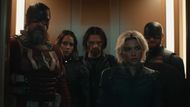In a time when superhero movies often choose spectacle over substance, Marvel's Thunderbolts* is a rare example of where the film's humanness stands out among it's all heroicness. In its theatrical debut earlier this week, Jake Schreier's Thunderbolts* successfully dives into some serious and consequential aspects of mental health, all the while refraining from sacrificing anything on it's grandeur.
Schreier offers an interesting perspective on the MCU, as he and the production team brilliantly depicted superheroes dealing with the real emotions and challenges of life instead.
Speaking to Discussing Film on X, the director delved deeper into the mental health aspects portrayed in the film as he said:
"We felt the idea that these feelings and the sense of emptiness or depression is not a niche idea, you know, and that we're at a place where everyone probably can connect with that. And so it felt like if you were going to make the 36th Marvel movie, and Kevin said from the beginning, like, do something different with this one, it felt like a different story to tell within this world."
Thunderbolts* succeeds due to it's central plot depicting the psychological struggles of titular characters. These aren't scenes of life-or-death struggle, instead, audience members are shown the character's grappling with their internal battles: depression, feelings of isolation, and struggling self-worth.
How mental health is depicted in Thunderbolts*?

The Thunderbolts are led by Florence Pugh's Yelena Belova as it explores her own struggles with her mental health and how she deals with her traumatic past and Natasha's death. She later becomes the leader of the team, leading with her humanistic ambitions rather than just strength and power,
Bob, also known as Sentry, is another important character in the film. Bob is the classic superhero, as in, he embodies both the hero and the villain. His evil alter ego - named the Void - represents a state of internal darkness. Which shows that the biggest threat to the superheroes in the film isn't just fighting someone, it's dealing with the aftermath of mental illness. Rather than writing a story about a team defeating Bob, the film is about a team empathizing with Bob and helping him get better.
Thunderbolts* also laid down the bricks for Avengers: Doomsday by changing the direction of the story from overt superheroics to more of a psychological exploration. The film, which includes Yelena and Bucky confronting their own traumas, introduces a more fractured and vulnerable team of heroes. The film made a transition to character-based rather than action-based narratives. It would certainly be interesting to note how this narrative is explored in the future.
Thunderbolts* is currently in theaters.
Love movies? Try our Box Office Game and Movie Grid Game to test your film knowledge and have some fun!
